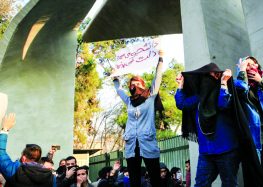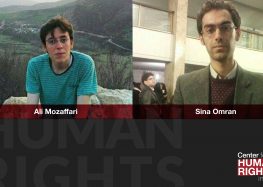Former Student Detainees Terrorized by their Interrogators
Threats include being charged with apostasy and execution
(16 June 2008) Security and intelligence agents are regularly contacting and terrorizing nine former student detainees with threats of prosecution under the charge of apostasy that can result in execution sentences. The International Campaign for Human Rights in Iran is gravely concerned about their security.
The students belong to a nation-wide student movement known as the “Freedom and Equality Seeking Group.”In December 2007 and January 2008, security forces detained 51 students belonging to the group who are also known for their leftist and Marxists beliefs. They were released only after posting extraordinary sums of bail, as much as 300 million Toman ($330,000).During the past few weeks, interrogators have repeatedly called and threatened several former detainees. They are Anousheh Azadfar, Bizhan Sabagh, Majid Ashrafnejad, Amin Ghazi, Behrouz Karimizadeh, Abed Tavancheh, Bita Samimizadeh, Peyman Piran, and Mehdi Geraylu.
“The calls are from our interrogators. I fully recognize their voices. One of them introduces himself as Haji Saeed and the other one Haj Mammad. There are also threatening calls from others whom we don’t recognize but claim they are fully familiar with our judicial cases,” one former detainee told the Campaign.
The interrogators have told the former detainees that they will soon be put on trial on charges of apostasy and sentenced to hanging. The students are living in constant fear and believe their trials will be held soon, during the summer recess, to prevent any protests within universities.
“The authorities should immediately end the persecution of these young people. They are being gratuitously terrorized by state agents,” the Campaign said.
In November 2007, students from Freedom and Equality Seeking Group announced plans for nation-wide peaceful gatherings on the occasion of National Student Day, December 7. After this announcement, security and intelligence forces launched a coordinated campaign lasting several weeks, and detaining 51 students throughout the country. Plain-cloth agents, without presenting any arrest warrants, grabbed students from their homes, classrooms, and off the streets in several cities including Babolsar, Shiraz, Mashad, and Tehran. In total, they confiscated 15 personal computers, 7 printers, and 500 books belonging to the group’s library, as well as video and audio equipment.
Peyman Piran, a former student and political activist, delivered a lecture to students in Tehran University on 4 December 2007 Security forces detained scores of students after his speech and detained him on the street as he left the campus. He has been arrested five times since July 1999 when student protests engulfed Tehran University. He has spent several months inside Evin Prison’s section 209, operated by the Intelligence Ministry.
“It was the first time I saw security forces who work in Evin Prison’s section 209 enter the Campus and detain students. Even during the July 1999 protests, security forces did not enter classrooms and university grounds, but only the dormitories,” he told the Campaign. “For example, they detained Mehdi Allahyari, a chemistry student at Sharif University and winner of silver medal in the Chemistry Olympiad, inside his classroom,” he added.
Most of the detainees were held in solitary confinement, without access to an attorney, for more than 40 days. They were released after posting large amounts of bail that ranged from 50 million Toman ($55,000) to 300 million Toman ($330,000). The authorities released the last detainee, Ali Kantouri, on 25 May, after six months of detention, on a 150 million Toman ($165,000) bail. One of the group’s supporters, Farhad Haj Mirzaii, a human rights and children rights activists, remains in prison in Kurdistan and is reportedly being subjected to torture.
All of the 51 detainees were interrogated about their opinions and religious beliefs during their detention. Several of them told the Campaign that the interrogators aimed to prove charges of apostasy against them and pressuring them to confess to connections with Communist groups abroad, planning armed activities.
“All of our interrogations revolved around our beliefs. They asked us if we believe in God or not. If our families are Muslim or not. If we did not prey, they would exert tremendous pressures on us. In response to the question of our family being Muslim or not, if we answered positively, they called us ‘Morted’ [apostate] and would say ‘we can obtain a fatva and execute you.’ They equated belief in Marxism with being against God, not a belief in social and economic equity,” several former detainees told the Campaign.
Regarding charges of links with Communist groups abroad, Peyman Piran told the Campaign: “We clearly articulated our thinking in several published articles, separating our positions from leftist groups abroad. We never had any physical contacts with these groups abroad. It was a big surprise to us of being accused of planning armed activities. Our activities included organizing mountain hikes, plays, exhibitions, and publications.”
Since the beginning of Mahmoud Ahmadinejad’s presidency, former security and military officers have been appointed as university chancellors and administrators. Following these appointments, academic freedom and right to education has been routinely violated. The Judiciary, under pressure from Intelligence Ministry, has prosecuted scores of students in unfair trials.
The threats against former student detainees are seemingly aimed at preventing freedom of thought and critical thinking inside academic circles. They are part of a pattern that includes the censorship of texts, research projects, and publications. During the past twelve months, according to a list compiled by the Campaign, at least 150 students have been detained and in most cases freed only after posting heavy bail amounts.
One student detainee, Ebrahim Lotfollahi, detained on 6 January 2008 by security agents in Sanandaj, died in detention under suspicious circumstances. The authorities buried him without allowing his family access to his body. Security forces routinely violently attack student who protest the conditions in their campuses. Scores of student publications have been banned.
“Freedom of thought and expression and freedom of assembly are inalienable rights of the academic community and all people in Iran. The Iranian government should immediately enter discussions with student and faculty representatives throughout the country to guarantee these rights and to restore a calm atmosphere inside the universities. Only then can students enjoy their right to education and academic freedom,” the Campaign said.
The Campaign called on the Iranian government to discipline its intelligence agents, ending threats against former student detainees as well as their further prosecution solely based on their beliefs and opinions.



